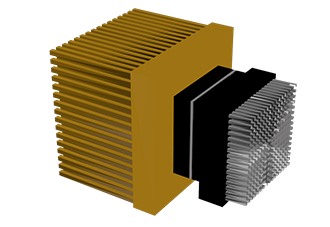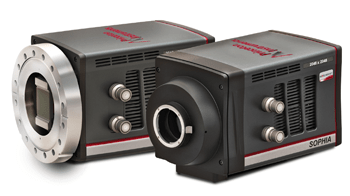Overview
SOPHIA® has ultra-low-noise electronics, with high sensitivity (>95% QE), speed and flexibility with multi-port readout capabilities up to 16 MHz and high frame rates. ArcTec™ technology allows for thermoelectric cooling without chillers or cryo-coolers.
- >95% peak QE
- 2 e- readout
- Fast, multiport readout
- ArcTec™ deep cooling
Key Features

Ultra-flexible performance
The SOPHIA provides multiple readout modes, with complete triggering support and independently optimized clocking for each combination, even ultrafast events can be captured.
The SOPHIA also contains a field-replaceable internal mechanical shutter for enhanced flexibility.

ArcTec™ cooling technology
Taking advantage of an all-metal hermetically sealed vacuum design, the ArcTec™ cooling technology prevents outgassing or long-term degradion. A custom heat sign design is utilized to ensure efficient thermal dissipation from the sensor and electronics.
The ArcTec™ available are air cooling only, liquid cooling only (for vibration-sensitive environments), or a combination.

SOPHIA 4096B Features
Improved Optical Design
The SOPHIA4096B has an improved field flattener and reduced window-to-CCD surface distance and window thickness. It offers improved edge sharpness and lower distortion.
Repeatable CCD positioning
With the ability to “zero out” variability in mechanical assembly, the SOPHIA 4096B can achieve precise, repeatable CCD orientation. The adjustable tilt, pitch and z-axis translation reduces the requirement for system-level adjustment.
Multi-TEC Design
The redesigned CCD cooling mechanism and vacuum chamber guarantees even heat dissipation for very large CCD formats, withstanding thermal cycling.

Powered by LightField software
Powerful and intuitive software with built-in math engine allows for the complete control of cameras and spectrographs, with real-time image analysis and spectral data.
LightField software provides seamless integration of hardware controls and direct data acquisition into programmes such as National Instruments’ LabVIEW® and MathWorks’ MATLAB®. This software also fully supports IntelliCal automated wavelength and intensity calibration.

